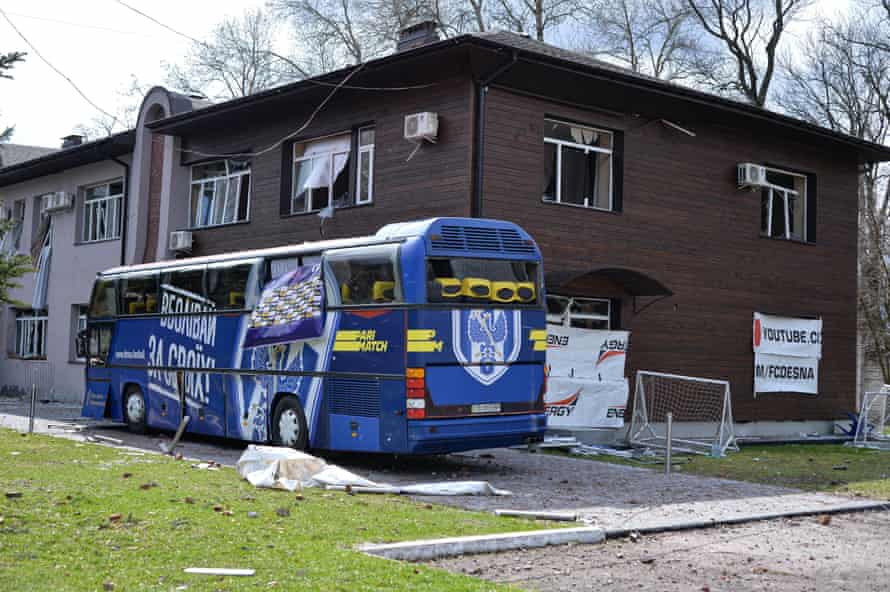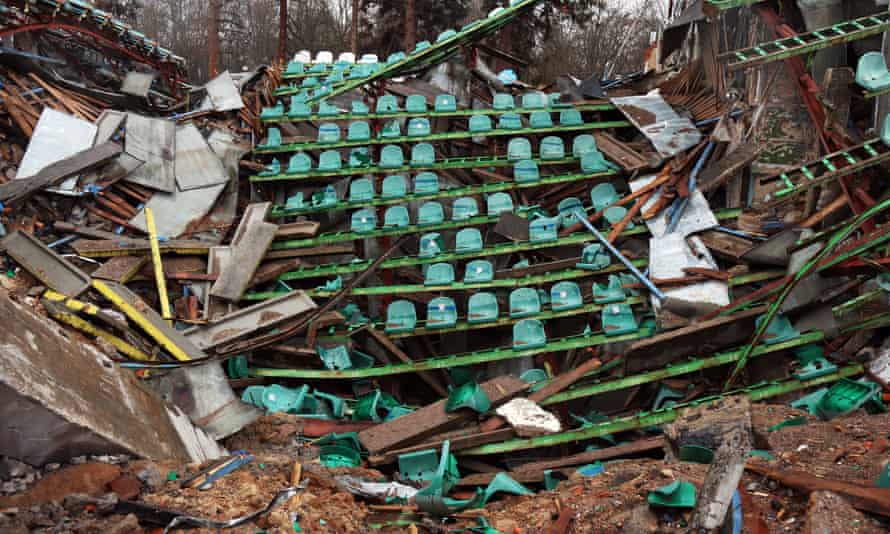Football in Ukraine: ‘Where will the children train now?’ | Football
VSHernihiv is the largest Ukrainian city liberated from Russian occupation. Its pre-war population was estimated at around 280,000. After being besieged for more than a month, only a third of that number remains. Seven hundred people lost their lives, according to official sources.
Before the Russian invasion on February 24, the city was little known in the world. It is located 150 kilometers northeast of kyiv and only 60 km from the border with Belarus, on the banks of the Desna River. In Ukraine, Chernihiv was known for its beautiful churches, posh parks and stunning riverside promenades.
The new reality for those left behind is difficult. Emerging from their hiding places after more than three weeks without electricity or running water, they are greeted by huge craters and destroyed structures. There are mountains of steel, concrete, glass and plastic. Here and there, torn posters and paintings, and small bits of metal add to a truly dystopian scene. Everywhere there are buildings – including hospitals, schools, libraries and apartment buildings – that have been destroyed.
One of the places in ruins is the local football ground. Unfortunately, this is a perfect illustration of the effects the Russian invasion had on all of Ukraine. Before the bombs destroyed it, it could hold 12,000 people – local team FC Desna played there in the Ukrainian Premier League, as did the women’s national team.
Now it has been reduced to rubble. The stands are destroyed, the windows broken. What remains of the once proud stadium has been left with meter-long cracks. Additionally, items including gym equipment, televisions and other accessories were stolen from offices. Meanwhile, on the ground there are craters up to four meters deep.
“At least five rockets hit the stadium. Everything is destroyed,” says Oleksandr Lomako, regional governor of Chernihiv. “This is civil infrastructure. The club had no military connection, there were no soldiers, no equipment, nothing. We have used this resort for both adults and children. From February 24, Chernihiv was constantly bombarded.
“All the buildings that were bombed are part of the civilian infrastructure,” he adds. “What are the children going to do now? Where will they train once the war is over?
“After the enemy blew up the bridge over the Desna River, Chernihiv became an island,” says Chernihiv regional deputy governor Dmytro Ivanov. “The Russians surrounded the city and then started bombing our food, our humanitarian aid, as well as the gas stations. There was no electricity; hundreds of people were dying. We couldn’t even bury them.
As recently as the 2019-20 season, Desna had his best campaign ever, qualifying for Europe after finishing fourth in the league. They faced German side Wolfsburg in the Europa League third qualifying round, losing 2-0 in a one-legged qualifier. Before the start of the war, Desna was seventh in the Ukrainian championship.

The stadium has a proud history – and a surprising old name – too. In 1961, Yuri Gagarin became the first human to travel into space. Then 27 years old, he became a hero all over the world and the Russian communist authorities awarded him the Order of Lenin and the title of Hero of the Soviet Union.
Three years after winning worldwide acclaim, Gagarin traveled to Chernihiv Stadium to meet fellow cosmonaut Andriyan Nikolayev. The moment had to be marked, so the stadium was named after Gagarin. Although it is now renamed the Olympic Sports Training Center, locals still call it “The Gagarin”.
All is not lost. Local and national authorities promised the club that the stadium would be rebuilt. Ukrainian Culture Minister Oleksandr Tkachenko spoke with his German counterparts, who assured him of their support. Borussia Dortmund have also promised to help. “They haven’t forgotten Andriy Yarmolenko,” said Tkachenko, referring to the West Ham striker who grew up in Chernihiv and started his professional career with Desna, before moving on to Dynamo Kyiv and Dortmund.
Help may be on the way, but Desna supporters have already gathered to clean up their stadium. At the weekend, a symbolic amateur match was even organized at Gagarin, on the side of the field where the bombs did not land. Football brings life to the stadium and to the club’s faithful.
The team’s first manager, Oleksandr Ryabokon, joined the Ukrainian Defense Forces in early April. “He is cleaning kyiv of Russian creatures,” said a spokesman for the Desna club. Under-19 coach Oleksandr Zub is also part of the military operation, as are former club owner Ivan Chaus and former player Dmytro Zaderetsky.

Along with Mariupol and Kharkiv, Chernihiv is now a “heroic city” following a decision by Ukrainian President Volodymyr Zelenskiy. Ukrainian soldiers promised the townspeople that the Russians would not return but, having witnessed the atrocities over the past two months, people are afraid to believe them.
“We don’t know when and how this war will end,” says Oleg, a Desna supporter. “We are normal people, but our normal lives have been taken away from us. We just don’t understand why anyone would attack and kill innocent civilians.
Sign up for The Recap, our weekly editors’ picks email.
“I go to the stadium every day with a couple of friends. It’s the only place in town where you can expect to hear the voices of happy children. It is football, the memories it has brought us and the hope for a normal future that keeps us going.


Comments are closed.